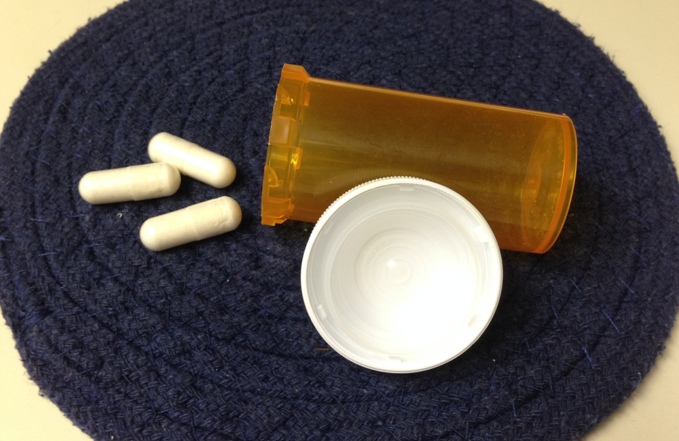Finishing Antibiotics:
The Pros & Cons

Should you finish your antibiotics prescription? The prevailing advice over the years has been to always, always finish the entire course you are prescribed. Yet very recently (July, 2017), that advice has received increased vocal criticism. This web page looks at the pros and cons of finishing these medications, but first it is important to understand a few things about them.
First, there are different classes, each with its intended use. Each of the drugs in the different classes has its benefits, its side effects and its contraindications. For example, the fluoroquinolones such as Cipro are known to potentially cause serious or disabling side effects such as tendon tears. Many of these drugs can pass into breast milk and cause diarrhea in you and in a nursing baby. Most are contraindicated in liver disease. Pharmacists and the medication inserts can explain the details of the drug this is prescribed to you.
Also, it is important to understand that these medications can be bactericidal or bacteriostatic, depending on the medication and the dosage. Bactericidal drugs kill bacteria outright. Not all bactericidal drugs kill every type of bacteria. Some are more effective at killing aerobic bacteria or anaerobic bacteria, while others are effective against many species in both types.
A bacteriostatic drug's mechanism of action is to stop bacteria from reproducing and/or growing. By not reproducing or growing, bacteria numbers drop over time. The type of antibiotic used and the strength of the dosage determine whether its actions are bactericidal or bacteriostatic. Sometimes multiple medications are prescribed at dosages to cover both actions.
It is also important to understand that probiotics and commensal bacteria suffer greatly in the presence of most antibiotics since they are more susceptible to them and less capable of transferring genes to develop resistance. Lastly, for medications such as these to work most effectively, your body's immune, lymph and elimination systems must be working well to be able to clean up dead bacterial debris and bacterial wastes and remove them from your body.
The Pros and Cons
One of the biggest pros of finishing antibiotics is that by taking the entire course, you are killing or stopping the reproduction and/or growth of as many of the pathogens causing your infection as possible. If you stop taking these types of medications as soon as you start feeling better, you may only have eradicated the weakest infectious bacteria, allowing the stronger ones to multiply. These stronger bacteria may require a different, stronger medication, a longer course of treatment, or repeated courses to combat them, all increasing the odds of antibiotic resistance.
Since the arsenal of antibiotics for doctors to choose from has limited diversity, there may not be another medication that would be effective for such a strong infection. The fear of development of resistance to known antibiotics is one reason why the recommendation to finish treatment was developed. This scenario of not having a drug to beat an infection due to resistance is real life. It causes deaths every day.
Lastly, another reason to finish the medication course is that you may also inadvertently transmit an infection if you think it is resolved but it is not.
On the flip side, finishing a course of antibiotics has its cons, also. One reason doctors may want to limit the length of treatment is that these medications can wipe out some species of gut bacteria in susceptible people, as previously mentioned. Sometimes the gut microbiota does not recover and infections such as C. difficile or a nasty E. coli opportunistically take hold.
The biggest drawback to completing a course of these medications, ironically, is antibiotic resistance, and that is the reasoning behind the latest debate on finishing them. Researchers who support the idea to stop taking these medications when you feel better say that although there are conditions that require a long or ongoing treatment period, many infections, such as urinary tract infections, are beat within 3 to 5 days. In their view, taking the drugs longer than necessary exposes the bacteria to the drugs longer and allows them to develop antibiotic resistance and transfer resistance genetics to other bacteria.
Yet another reason to limit the length of treatment is that antibiotics can make other medications, such as birth control pills, less effective, or interfere with the actions of other drugs. For example, metronidazole is known to interact with 350 different drugs. Lastly, allergies to these medications can develop.
The Problem with Recurrent Infections
What about those infections, like bacterial vaginosis (BV) or urinary tract infections (UTI), which seem to be eradicated, only to recur again and again? The success rate for antibiotic treatment for BV is dismally low, as this page of my website explains. Stopping treatment too early can result in immediate relapse. However, finishing treatment does not guarantee resolution of the infection.
My opinion, based on reading thousands of research articles and by solving my own problem with recurrent sinus infections years ago, is that beating down pathogen numbers to reduce an infection with medications is only one part of the potential solution. The key is to have a healthy milieu, or environment, to discourage infection from starting in the first place and help the body to eliminate it on its own if it does develop. The way to have a healthy milieu is to treat your body well.
Consume nutrient dense foods and drinks, including cultured or fermented ones. Consider daily probiotics. Move your body to keep it stronger and more capable of fighting infections as well as to move lymph fluid and open elimination pathways to clean out dead cell debris. Do whatever it takes to have an established bedtime routine so that you maximize effective sleep.
Avoid things, such as sugary foods and drinks, which fuel pathogens and suppress your immune system. Avoid things that harm your health, such as smoking, consistent alcohol intake, unnecessary drugs and unrelenting stress. If you would like help with dietary and lifestyle interventions to encourage a healthy milieu prior to, during and after antibiotic usage, consider nutritional consultations with me.
What is the Takeaway for Finishing Antibiotics?
There is a time and a place for use of these medications, but trying to reduce your need for having to use them is excellent preventative action. More and more doctors are becoming savvy concerning the prescribing of these drugs. As such, your doctor can be your best resource to know how long the particular type of medication he/she is recommending should be used for your particular condition. Ask questions of the doctor and the pharmacist, and inquire whether the drug and drug-treatment length the doctor prescribes is the best one for you and what kind of success you can anticipate.
More research studies to develop guidelines for various types of infections are warranted, but until such guidelines are available, follow what your doctor and/or pharmacist recommend. If you can have testing performed to check the status of an infection and the specific microbes involved before and after the course of drug treatment, that is the most comprehensible way to know if your treatment is/was suited to your condition.
Of course, be sure to take probiotics and sources of beneficial microbes throughout the day any time you are on antibiotics. Studies show that antibiotic use increases your susceptibility to pathogens such as C. difficile. This was clearly shown in a hamster model. Antibiotic treatment led to dysbiosis, an altered gut microbiome. The extent of dysbiosis created by antibiotic treatment with moxifloxacin or clindamycin was related to the level of mortality caused by a C. difficile challenge in hamsters.
Also, remember, these types of drugs are ineffective against viruses.
Return to page on health benefits.
Return to Homepage.
I research studies and share my clinical experience to write this free site to help you find solutions to your problems. As part of that, I recommend products and services that I genuinely believe will be of help to you. If you click on a link to a product/service, I may receive a small commission to support my efforts if you buy something. The item does not cost you more.
Thanks for visiting this site! If you've enjoyed reading this page or have found the information to be useful to you, please "like", tweet about it, or share it so others can benefit, too. You can leave comments below via Facebook or Disqus.
Comment with Disqus (including as a guest), Twitter or Google accounts:
If you are one of my many readers without a Facebook account, you can still comment.
Disclaimer: Please note: By law, I cannot provide any personalized recommendations for your specific health concern on this site. The information contained in this site is educational in nature and is not intended as diagnosis, treatment, prescription or cure for any physical or mental disease, nor is it intended as a substitute for regular medical care. Consult with your doctor regarding any health or medical concerns you may have.
Subscribe to my monthly newsletter and receive a free copy of "How to Use Probiotics to Lose Weight and Be Healthier".

To comply with the EU's GDPR data privacy regulation, please subscribe here:
Looking for some quality professional supplements, including probiotics? Check out my online dispensary, as I will be doing reviews of some of these products in the future. Click on the Fullscript picture. (Note: If you were a former Wellevate customer, please switch to Fullscript for a better customer experience. Thanks!)
Some competitors of SBI (Solo Build It) are posting fake negative reviews of SBI. If you are considering creating your own website business, or if you have a brick-and-mortar business but want an online presence, I highly recommend SBI!





Comment with Facebook!
I'd love to hear your opinion about what you just read. Leave me a comment in the box below! Other commenting options follow the Facebook comments.